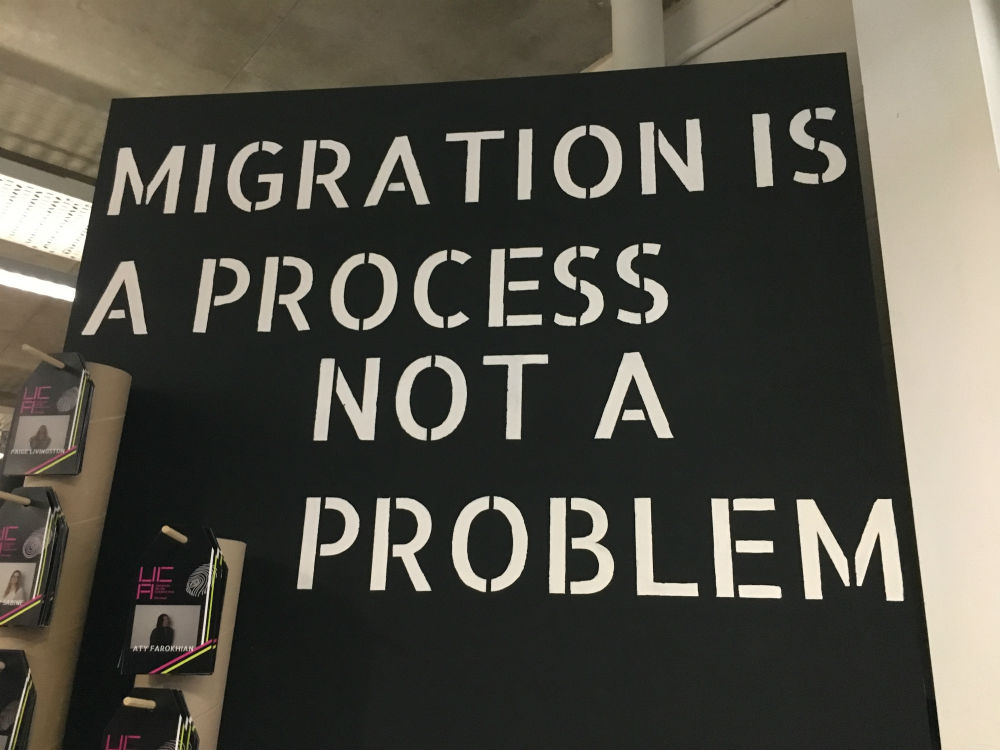
I started writing ILLEGAL in early 2018 as a release for the anxiety I felt while waiting for a decision about my Permanent Residence application. I don’t know why it flowed out of me in verse, but all of a sudden, I had scene after scene of a narrative poem inspired by my experience. I contemplated developing it as a monologue, but it felt too self-indulgent to make a solo show about my story in light of everything happening at the U.S./Mexico border at the time.
When I told theatre-maker Gary McNair about the piece, he recommended I consider adding another narrative. I was obsessively reading news stories about immigration, and one of the next articles I came across was about a Guatemalan woman trying to emigrate to the town in which I’d grown up. I couldn’t believe what she’d risked to make a better life for herself, or that her goal was simply to get to the place I’d left behind. I knew immediately that hers was the story I wanted to tell alongside mine. I would probably have done exactly what she did if I’d been born into her world.
Though our backgrounds and journeys were very different, I could empathise with her plight because I’d spent the last decade fighting my own immigration struggle—albeit a bureaucratic one. In Italy and Spain, I’d taught English for employers who’d promised to get me work visas but couldn’t because I only had an American passport. In the U.K., I had to pay twice for my student visa because the UKBA couldn’t be bothered to call and ask me to submit an original document--they simply denied the application and made me pay another $400 to re-apply.
I missed Christmases with my family and had to give up jobs I was offered abroad because the U.K.B.A. holds on to an applicant’s passport for months while deciding whether to grant a visa. This policy meant that I couldn’t leave the U.K. for any reason, for four months.
During one of these periods, my primary employer suspended me because the UKBA refused to confirm or deny my right to work until my application was processed. I couldn’t apply for any new jobs without my passport, nor was I eligible for benefits. As a freelancer on zero hours contracts, I became reliant on my partner’s income. When I requested an update after 3 months, the UKBA said they didn’t answer questions about applications until 6 months after submission.

I spent months requesting documents, filling out forms and saving up for each of my visas, all of which cost more time and money than I could afford as a working artist. However, those expenditures were nothing compared to the constant uncertainty I lived with for nine years. Not knowing whether I would be allowed to remain in the U.K. led me to question every purchase I made and to fear planning personal or professional commitments more than a couple months in advance. It also made me question my artistic abilities because I never met the ridiculously high standards required to apply for an Exceptional Talent visa. (Many of my immigrant artist peers left the country because they didn’t qualify either.) It frustrates me to this day that my Indefinite Leave to Remain is based on my partner, rather than on my own work: the contributions I make to the country in both taxes and art don’t seem to matter.
ILLEGAL’s development was fuelled in part by that frustration, fear and uncertainty--and by the anger I felt about how differently a Guatemalan woman and I were treated by our respective immigration systems, based on our races and nationalities. I still get emotional when I think about what happened to her. While my immigration struggle was an all-consuming challenge, it was nothing in comparison to what she went through—or compared to what millions of immigrants are facing at borders around the world at this very minute.
ILLEGAL is a show made by, for and about immigrants. It’s designed to raise awareness about our stories and to make immigrants feel welcome in our countries of residence by changing the narrative around migration. I’d love for the show to touch enough hearts to change international immigration policies, but I know that’s a long shot. I saw a sign at the University for the Creative Arts Degree Show earlier this year that said ‘Migration is a process, not a problem.’ If ILLEGAL can encourage audiences to think that way, perhaps they’ll use their votes and resources to put an end to the terrifyingly hostile anti-immigrant environments that still plague our times.
ILLEGAL plays at Underbelly Cowgate (venue 61), Edinburgh Fringe Festival 2019, until August 25, at 12pm.
Tagged in Edinburgh Festival Fringe

